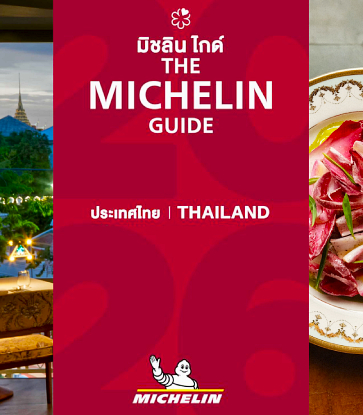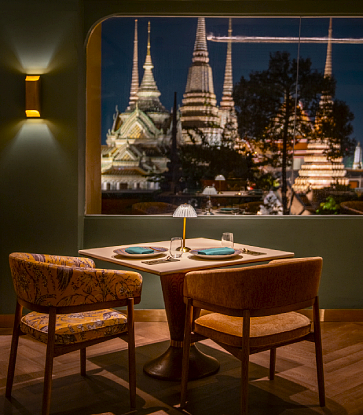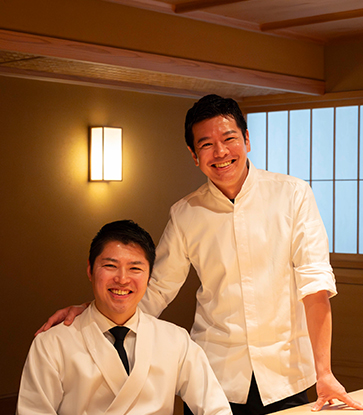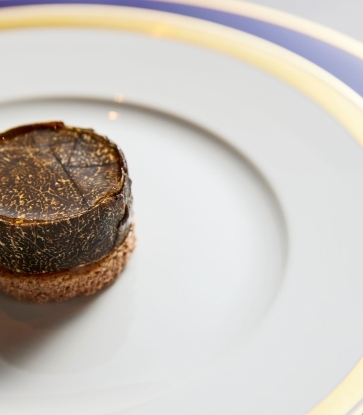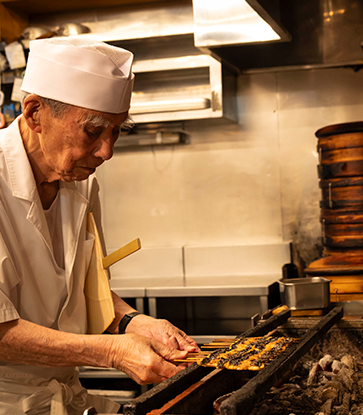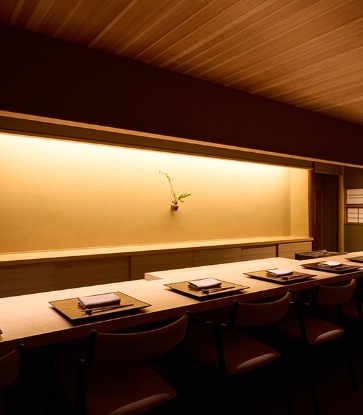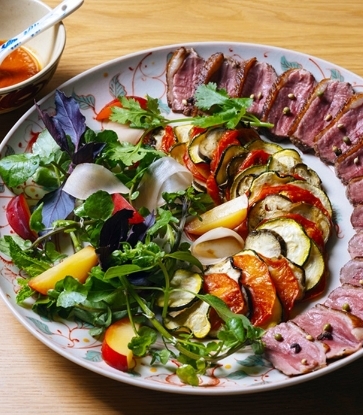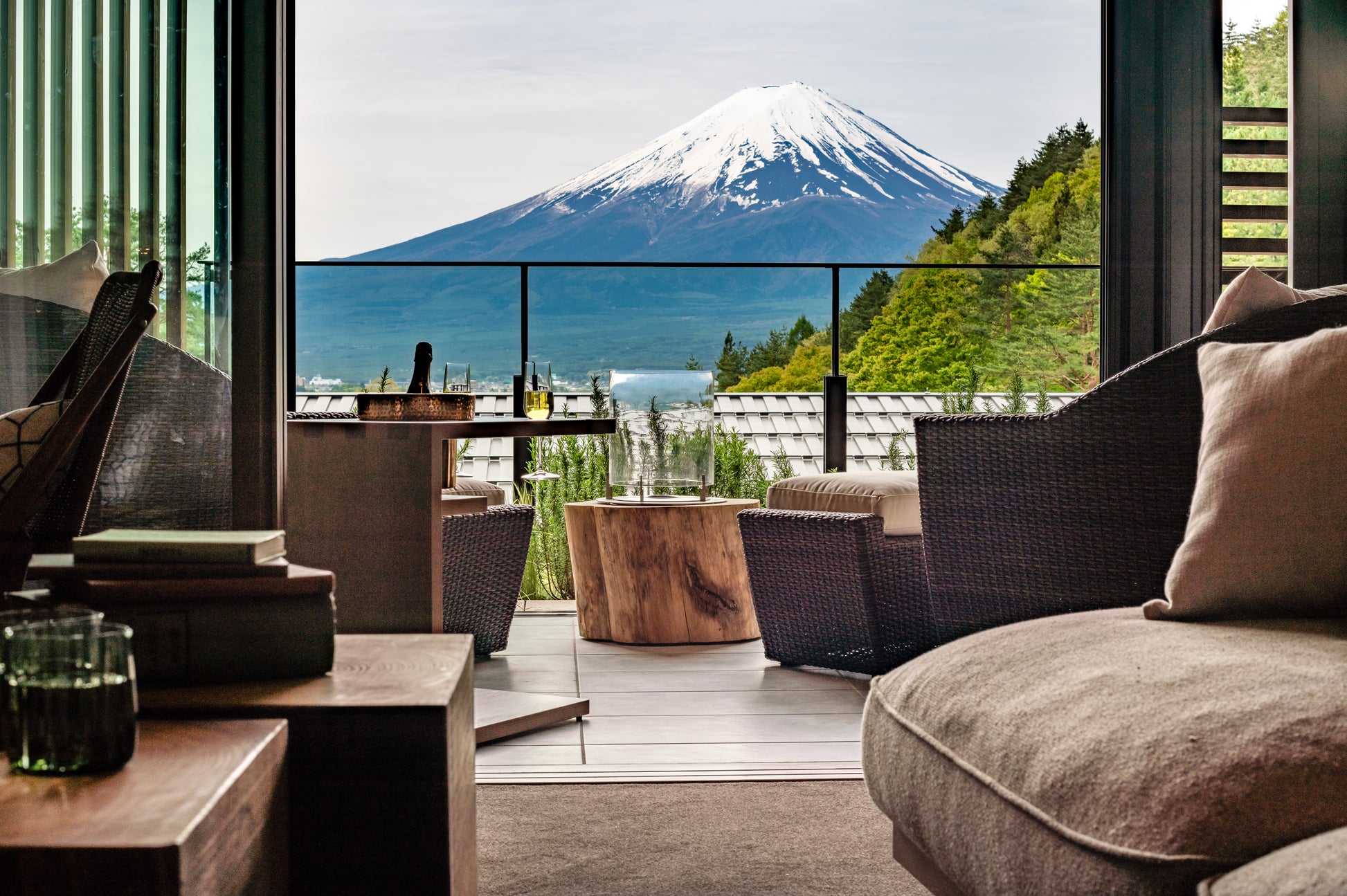The Mentor Chef Award is bestowed on chefs whose work and career are models for others to follow. The award honours chefs who devote themselves to training the next generation, serve with passion as guides for others and contribute to the advancement of the restaurant industry.
Chef Ishikawa is the representative of the Ishikawa Group of restaurants. In addition to Kagurazaka Ishikawa, which Ishikawa manages personally, Ishikawa Group restaurants Guchokuni, Kohaku, Hato, Torakuro and Ren Mishina are all listed in the MICHELIN Guide. Ishikawa’s devotion to his culinary disciples—training them as chefs, providing stages on which to shine, guiding them as a skilled instructor—has earned him the respect of Japan’s gastronomic world.

Tucked behind Kagurazaka Bishamonten Zenkokuji Temple and surrounded by a black fence lies Kagurazaka Ishikawa. Pull the door gently and your eyes are greeted by a cobblestoned footpath sprinkled with water, a goldfish bowl, and small paired stone statues of komainu, guardian lion-dogs such as one sees at a Shinto shrine. Before you unfold a pure, uncluttered space. On the day of our visit, Chef Ishikawa greeted us with a sunny smile. He spoke with us about fostering chefs and of his dreams for the future.

Learning and Growing Together
What Ishikawa holds dear is the attitude of learning together. An apprentice is not a servant. Even newly-hired staff join him at the counter serving customers. ‘If they make a mistake, I trade laughter and smiles with them while cautioning them, because it’s important to make sure this doesn’t negatively affect your customers dining experience,’ Ishikawa informed us, his demeanour cheerful and unassuming. ‘Solving problems effectively falls on the skill of the senior worker. Both senior and junior employees are in a sense teachers, and as humans we’re all equal.’
In addition to cooking, Chef Ishikawa leads his apprentices in other endeavours, arranging study sessions and hands-on learning events on topics such as rice planting and flower arrangement. His heartfelt devotion to his young staff drives Ishikawa to provide them with numerous opportunities to acquire skills that will help them develop.

Training the Mind and Spirit
Ensuring the happiness of the customers facing him across the counter is Ishikawa’s top priority. There are no sales targets. To orient his staff toward this goal, Ishikawa trains his charges in mind and spirit, instilling a shared determination.One way of doing this is by book reading sessions. In each Ishikawa Group restaurant, taking turns reading passages from a book chosen by the head chef is a part of the daily routine. The readings falter at times, as the apprentices sometimes stumble over rare or difficult Chinese characters. Rather than focus on these moments, however, the staff are encouraged to feel the writer’s intended meaning. The aim is to banish distractions and discern the true nature of the content. ‘How you view a task, whether you think it’s hardship or fun, affects the atmosphere,’ Ishikawa remarked. ‘I want to cultivate a richness of spirit.’

Ishikawa’s Style is to Trust People and Leave Them to It
Even a young staff member may be elevated to head chef given the right qualities. Ishikawa’s style is to trust his people and leave them to fulfil their tasks. ‘In cooking, as in life, there are no clear-cut answers,’ he explained. ‘I give my people advice when they ask for it, but unnecessary words just get in the way. I want my chefs to believe in themselves and pursue tastes they can stand behind with pride.’ Because confidence is founded on experience, Chef Ishikawa frequently takes his staff to dinner at other restaurants. The same principle underlies the many learning experiences Ishikawa offers.
Similarly, Ishikawa’s practice of leaving his chefs to their own devices springs from a desire to instil problem-solving skills. It’s a tough but necessary approach if his chefs are to grow as individuals. On the other hand, when chefs take over as masters of their own restaurants, ‘If they fail, they can always come back under my wing. I chose them, so I’m responsible, after all.’ It is precisely because they are backed by this relationship of trust that the young chefs can demonstrate their talents naturally, without hesitation.

Staff are Friends Who Grow with Their Chef
Chef Ishikawa is now cheerful and thoughtful but, he told us, as a young man he found it hard to keep motivated and would just quit his jobs. At his first place of employment, he had a difference of opinion with his supervisor and neglected his work. With no place to go, Ishikawa spent the day riding the trains, transferring from one line to the next. When he returned to his lodgings, his boss was there waiting for him. ‘My boss told me he had misunderstood, and apologized,’ Ishikawa recalled. “Tomorrow let’s see what we can do together,” he told me. I was so happy I burst into tears.’
Today, when he has concerns about a staff member, Chef Ishikawa listens kindly to what he or she has to say. ‘If we can overcome the problem together without giving up, it becomes a bond between us,’ explained Ishikawa, looking a bit embarrassed. ‘I have a great relationship with my staff. It’s different from colleagues and from family. We’re friends who are growing together.’

Ishikawa’s Dream as a Chef
Despite his responsibilities as head of his restaurant group, Ishikawa takes his place behind the counter as a chef every day. The more he accumulates learning and experience, the more he loves cuisine. Last year Chef Ishikawa changed his menu, earning enthusiastic reactions from his customers. ‘I’m 57 years old and it feels like I’ve just entered my growth period. A bit late, I guess,’ Ishikawa quipped, taking care, as always, to evoke laughter in his guests.
Influenced by the Chinese notion of wu-wei ziran (mui shizen in Japanese, roughly ‘eschewing artifice and being oneself’), Chef Ishikawa seeks to be true to his own spirit as it evolves over time. ‘I’m not so much interested in making dishes that catch the eye as dishes that I alone can express,’ Ishikawa explained. ‘I want to mature as I grow. I’m looking forward to seeing what sensitivity I’ll have, what sort of cuisine I create, when I’m 70.’

Although his role is that of a guide, Chef Ishikawa is never haughty, always treating his staff as equals. Stern yet warm, Ishikawa inspires confidence, enabling his young charges to step out into the wider world with their minds at ease, finding their own paths through their mentor’s guidance. We can only wonder how many more chefs will learn, grow, and ultimately take flight in the future, thanks to Chef Ishikawa’s expert tutelage.

Related Restaurant:
Kagurazaka Ishikawa
Related Pages:
- 422 restaurants, including 2 new Two Starred establishments, spotlighted in the MICHELIN Guide Tokyo 2023
- Kyoto Mentor Chef Award: Eiichi Takahashi of Hyotei, Three MICHELIN Star Restaurant






